Leadership and Management for Service Industries: HNC Assignment
VerifiedAdded on 2021/02/21
|8
|2425
|51
Report
AI Summary
This report delves into the realm of leadership and management within the service industry, using the Wa-Pila Hotel as a case study. It begins by examining classical management theories and their practical application, alongside a detailed analysis of diverse leadership styles. The report investigates the influence of internal and external factors on management approaches, providing a comprehensive overview of management and leadership skills essential for success in various service sectors. It explores both soft and hard skills, focusing on communication, teamwork, and the strategic use of marketing techniques and technology. Furthermore, the report looks at future trends in management, including the importance of creativity, technological advancement, and flexible services to attract customers. The report also addresses organizational change management, contrasting different leadership styles such as transformational, transactional, and democratic approaches, with real-world examples like Tesco and Wa-Pila Hotels. The conclusion highlights the vital role of managers in setting goals and fostering innovation, emphasizing the importance of employee communication and the utilization of online platforms to enhance customer satisfaction. The report is a valuable resource for students seeking to understand the complexities of leadership and management in the service sector.
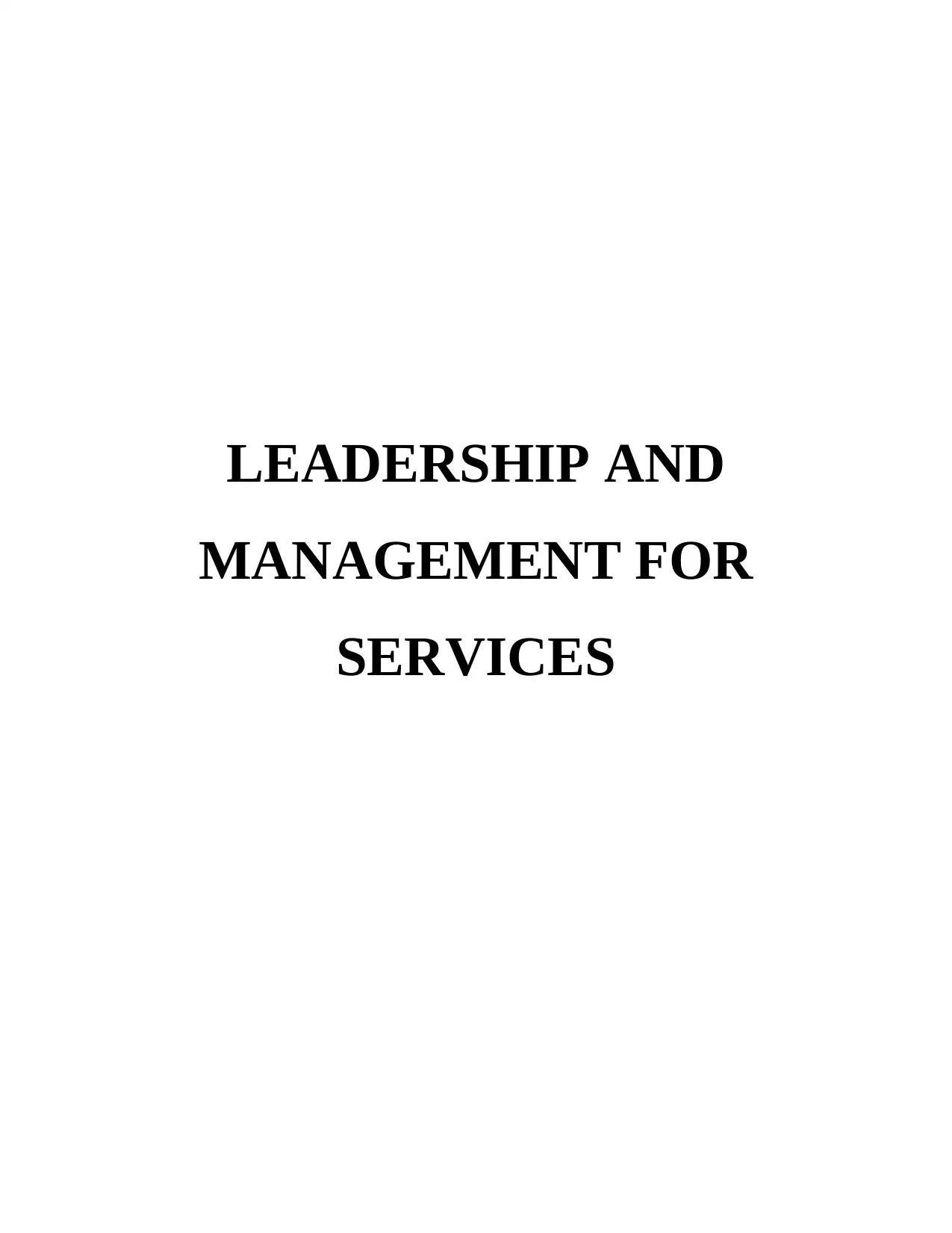
LEADERSHIP AND
MANAGEMENT FOR
SERVICES
MANAGEMENT FOR
SERVICES
Paraphrase This Document
Need a fresh take? Get an instant paraphrase of this document with our AI Paraphraser
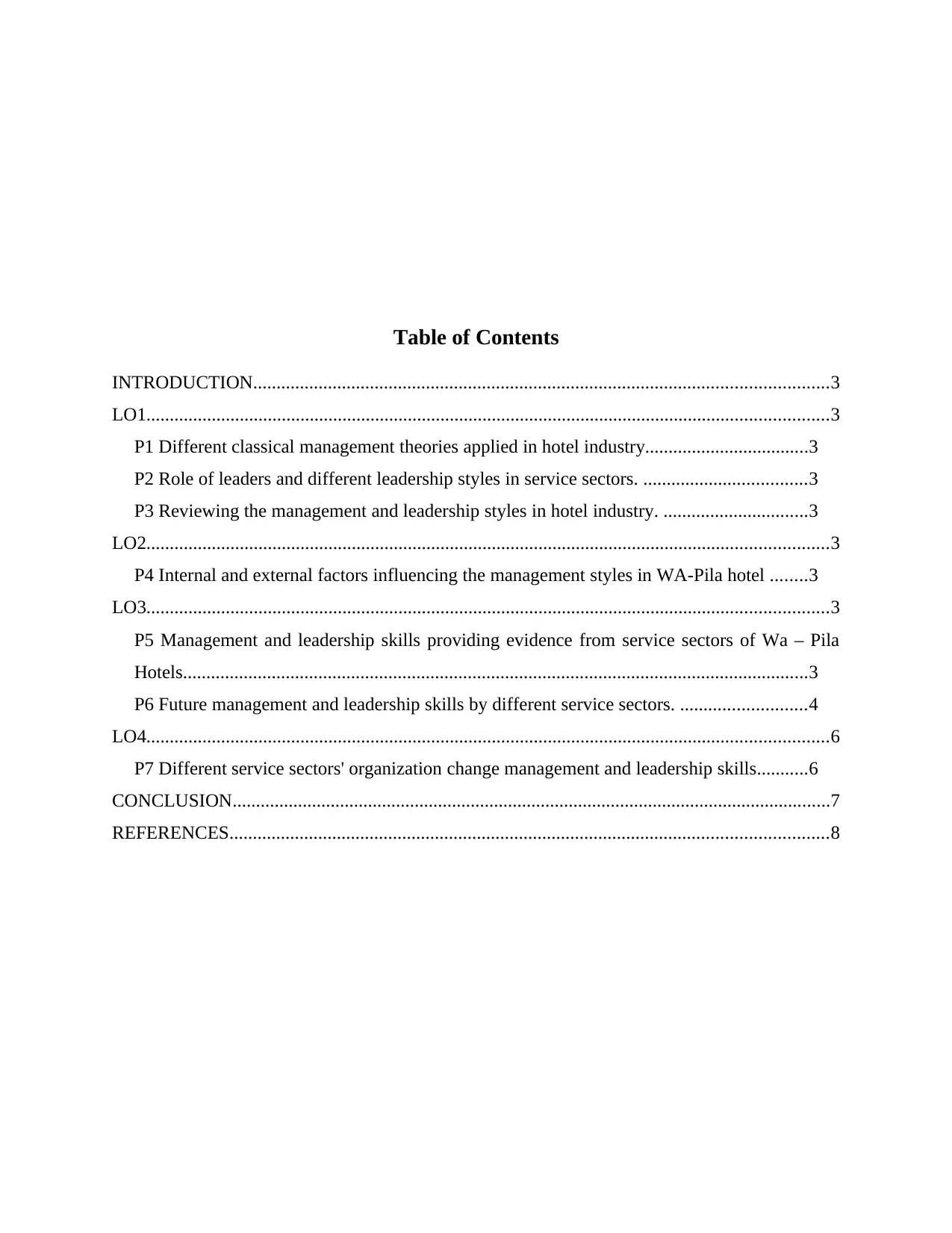
Table of Contents
INTRODUCTION...........................................................................................................................3
LO1..................................................................................................................................................3
P1 Different classical management theories applied in hotel industry...................................3
P2 Role of leaders and different leadership styles in service sectors. ...................................3
P3 Reviewing the management and leadership styles in hotel industry. ...............................3
LO2..................................................................................................................................................3
P4 Internal and external factors influencing the management styles in WA-Pila hotel ........3
LO3..................................................................................................................................................3
P5 Management and leadership skills providing evidence from service sectors of Wa – Pila
Hotels......................................................................................................................................3
P6 Future management and leadership skills by different service sectors. ...........................4
LO4..................................................................................................................................................6
P7 Different service sectors' organization change management and leadership skills...........6
CONCLUSION................................................................................................................................7
REFERENCES................................................................................................................................8
INTRODUCTION...........................................................................................................................3
LO1..................................................................................................................................................3
P1 Different classical management theories applied in hotel industry...................................3
P2 Role of leaders and different leadership styles in service sectors. ...................................3
P3 Reviewing the management and leadership styles in hotel industry. ...............................3
LO2..................................................................................................................................................3
P4 Internal and external factors influencing the management styles in WA-Pila hotel ........3
LO3..................................................................................................................................................3
P5 Management and leadership skills providing evidence from service sectors of Wa – Pila
Hotels......................................................................................................................................3
P6 Future management and leadership skills by different service sectors. ...........................4
LO4..................................................................................................................................................6
P7 Different service sectors' organization change management and leadership skills...........6
CONCLUSION................................................................................................................................7
REFERENCES................................................................................................................................8
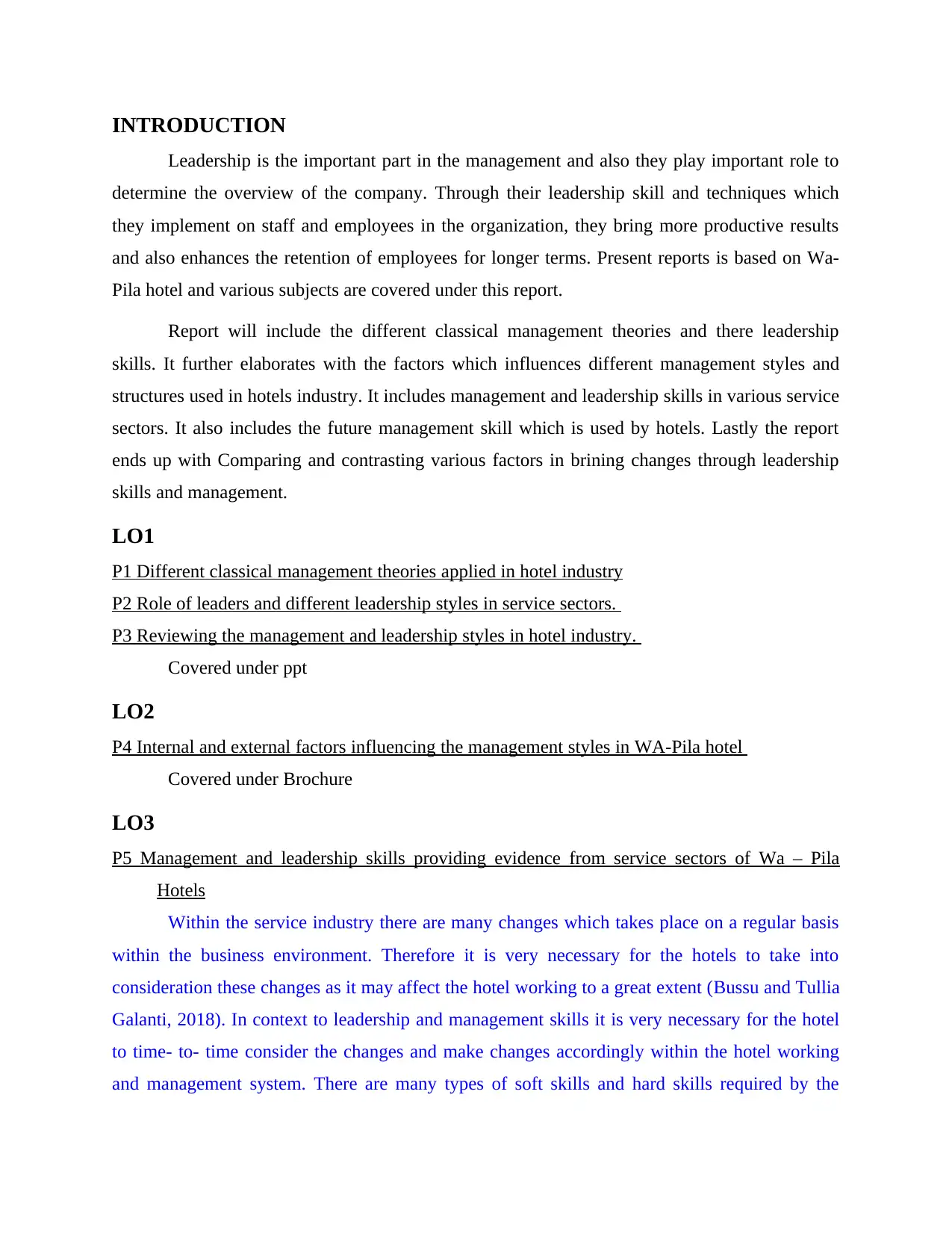
INTRODUCTION
Leadership is the important part in the management and also they play important role to
determine the overview of the company. Through their leadership skill and techniques which
they implement on staff and employees in the organization, they bring more productive results
and also enhances the retention of employees for longer terms. Present reports is based on Wa-
Pila hotel and various subjects are covered under this report.
Report will include the different classical management theories and there leadership
skills. It further elaborates with the factors which influences different management styles and
structures used in hotels industry. It includes management and leadership skills in various service
sectors. It also includes the future management skill which is used by hotels. Lastly the report
ends up with Comparing and contrasting various factors in brining changes through leadership
skills and management.
LO1
P1 Different classical management theories applied in hotel industry
P2 Role of leaders and different leadership styles in service sectors.
P3 Reviewing the management and leadership styles in hotel industry.
Covered under ppt
LO2
P4 Internal and external factors influencing the management styles in WA-Pila hotel
Covered under Brochure
LO3
P5 Management and leadership skills providing evidence from service sectors of Wa – Pila
Hotels
Within the service industry there are many changes which takes place on a regular basis
within the business environment. Therefore it is very necessary for the hotels to take into
consideration these changes as it may affect the hotel working to a great extent (Bussu and Tullia
Galanti, 2018). In context to leadership and management skills it is very necessary for the hotel
to time- to- time consider the changes and make changes accordingly within the hotel working
and management system. There are many types of soft skills and hard skills required by the
Leadership is the important part in the management and also they play important role to
determine the overview of the company. Through their leadership skill and techniques which
they implement on staff and employees in the organization, they bring more productive results
and also enhances the retention of employees for longer terms. Present reports is based on Wa-
Pila hotel and various subjects are covered under this report.
Report will include the different classical management theories and there leadership
skills. It further elaborates with the factors which influences different management styles and
structures used in hotels industry. It includes management and leadership skills in various service
sectors. It also includes the future management skill which is used by hotels. Lastly the report
ends up with Comparing and contrasting various factors in brining changes through leadership
skills and management.
LO1
P1 Different classical management theories applied in hotel industry
P2 Role of leaders and different leadership styles in service sectors.
P3 Reviewing the management and leadership styles in hotel industry.
Covered under ppt
LO2
P4 Internal and external factors influencing the management styles in WA-Pila hotel
Covered under Brochure
LO3
P5 Management and leadership skills providing evidence from service sectors of Wa – Pila
Hotels
Within the service industry there are many changes which takes place on a regular basis
within the business environment. Therefore it is very necessary for the hotels to take into
consideration these changes as it may affect the hotel working to a great extent (Bussu and Tullia
Galanti, 2018). In context to leadership and management skills it is very necessary for the hotel
to time- to- time consider the changes and make changes accordingly within the hotel working
and management system. There are many types of soft skills and hard skills required by the
⊘ This is a preview!⊘
Do you want full access?
Subscribe today to unlock all pages.

Trusted by 1+ million students worldwide
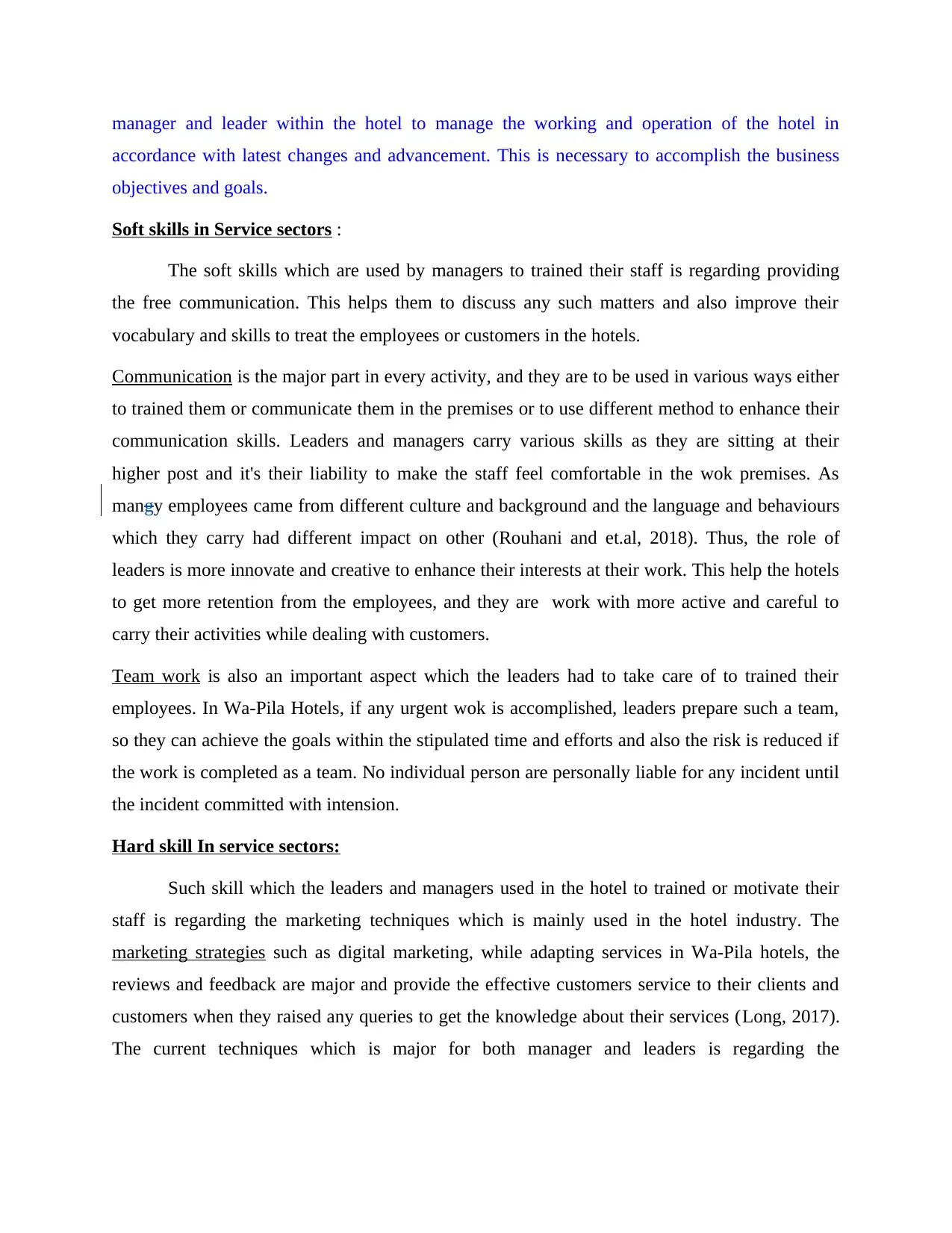
manager and leader within the hotel to manage the working and operation of the hotel in
accordance with latest changes and advancement. This is necessary to accomplish the business
objectives and goals.
Soft skills in Service sectors :
The soft skills which are used by managers to trained their staff is regarding providing
the free communication. This helps them to discuss any such matters and also improve their
vocabulary and skills to treat the employees or customers in the hotels.
Communication is the major part in every activity, and they are to be used in various ways either
to trained them or communicate them in the premises or to use different method to enhance their
communication skills. Leaders and managers carry various skills as they are sitting at their
higher post and it's their liability to make the staff feel comfortable in the wok premises. As
mangy employees came from different culture and background and the language and behaviours
which they carry had different impact on other (Rouhani and et.al, 2018). Thus, the role of
leaders is more innovate and creative to enhance their interests at their work. This help the hotels
to get more retention from the employees, and they are work with more active and careful to
carry their activities while dealing with customers.
Team work is also an important aspect which the leaders had to take care of to trained their
employees. In Wa-Pila Hotels, if any urgent wok is accomplished, leaders prepare such a team,
so they can achieve the goals within the stipulated time and efforts and also the risk is reduced if
the work is completed as a team. No individual person are personally liable for any incident until
the incident committed with intension.
Hard skill In service sectors:
Such skill which the leaders and managers used in the hotel to trained or motivate their
staff is regarding the marketing techniques which is mainly used in the hotel industry. The
marketing strategies such as digital marketing, while adapting services in Wa-Pila hotels, the
reviews and feedback are major and provide the effective customers service to their clients and
customers when they raised any queries to get the knowledge about their services (Long, 2017).
The current techniques which is major for both manager and leaders is regarding the
accordance with latest changes and advancement. This is necessary to accomplish the business
objectives and goals.
Soft skills in Service sectors :
The soft skills which are used by managers to trained their staff is regarding providing
the free communication. This helps them to discuss any such matters and also improve their
vocabulary and skills to treat the employees or customers in the hotels.
Communication is the major part in every activity, and they are to be used in various ways either
to trained them or communicate them in the premises or to use different method to enhance their
communication skills. Leaders and managers carry various skills as they are sitting at their
higher post and it's their liability to make the staff feel comfortable in the wok premises. As
mangy employees came from different culture and background and the language and behaviours
which they carry had different impact on other (Rouhani and et.al, 2018). Thus, the role of
leaders is more innovate and creative to enhance their interests at their work. This help the hotels
to get more retention from the employees, and they are work with more active and careful to
carry their activities while dealing with customers.
Team work is also an important aspect which the leaders had to take care of to trained their
employees. In Wa-Pila Hotels, if any urgent wok is accomplished, leaders prepare such a team,
so they can achieve the goals within the stipulated time and efforts and also the risk is reduced if
the work is completed as a team. No individual person are personally liable for any incident until
the incident committed with intension.
Hard skill In service sectors:
Such skill which the leaders and managers used in the hotel to trained or motivate their
staff is regarding the marketing techniques which is mainly used in the hotel industry. The
marketing strategies such as digital marketing, while adapting services in Wa-Pila hotels, the
reviews and feedback are major and provide the effective customers service to their clients and
customers when they raised any queries to get the knowledge about their services (Long, 2017).
The current techniques which is major for both manager and leaders is regarding the
Paraphrase This Document
Need a fresh take? Get an instant paraphrase of this document with our AI Paraphraser
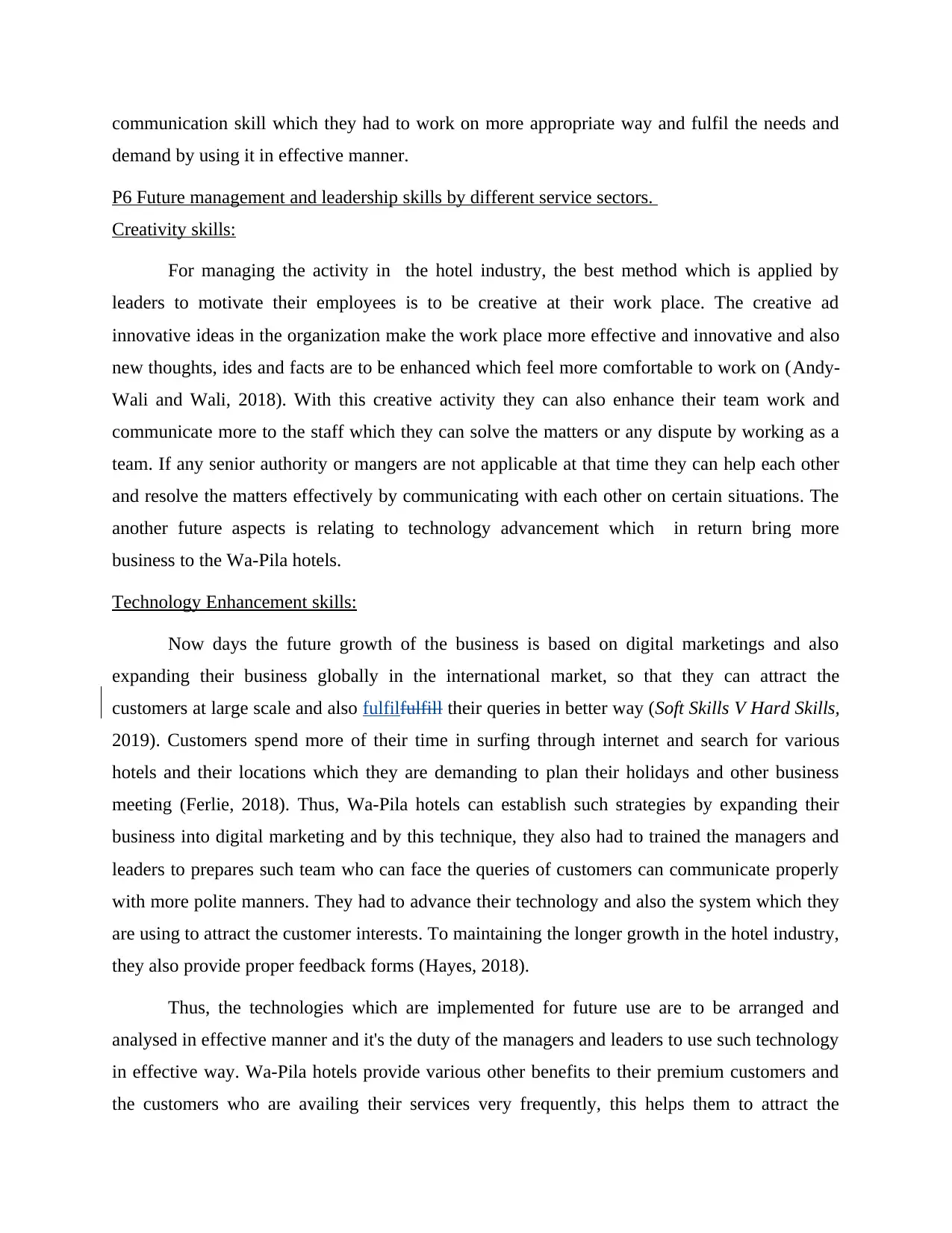
communication skill which they had to work on more appropriate way and fulfil the needs and
demand by using it in effective manner.
P6 Future management and leadership skills by different service sectors.
Creativity skills:
For managing the activity in the hotel industry, the best method which is applied by
leaders to motivate their employees is to be creative at their work place. The creative ad
innovative ideas in the organization make the work place more effective and innovative and also
new thoughts, ides and facts are to be enhanced which feel more comfortable to work on (Andy-
Wali and Wali, 2018). With this creative activity they can also enhance their team work and
communicate more to the staff which they can solve the matters or any dispute by working as a
team. If any senior authority or mangers are not applicable at that time they can help each other
and resolve the matters effectively by communicating with each other on certain situations. The
another future aspects is relating to technology advancement which in return bring more
business to the Wa-Pila hotels.
Technology Enhancement skills:
Now days the future growth of the business is based on digital marketings and also
expanding their business globally in the international market, so that they can attract the
customers at large scale and also fulfilfulfill their queries in better way (Soft Skills V Hard Skills,
2019). Customers spend more of their time in surfing through internet and search for various
hotels and their locations which they are demanding to plan their holidays and other business
meeting (Ferlie, 2018). Thus, Wa-Pila hotels can establish such strategies by expanding their
business into digital marketing and by this technique, they also had to trained the managers and
leaders to prepares such team who can face the queries of customers can communicate properly
with more polite manners. They had to advance their technology and also the system which they
are using to attract the customer interests. To maintaining the longer growth in the hotel industry,
they also provide proper feedback forms (Hayes, 2018).
Thus, the technologies which are implemented for future use are to be arranged and
analysed in effective manner and it's the duty of the managers and leaders to use such technology
in effective way. Wa-Pila hotels provide various other benefits to their premium customers and
the customers who are availing their services very frequently, this helps them to attract the
demand by using it in effective manner.
P6 Future management and leadership skills by different service sectors.
Creativity skills:
For managing the activity in the hotel industry, the best method which is applied by
leaders to motivate their employees is to be creative at their work place. The creative ad
innovative ideas in the organization make the work place more effective and innovative and also
new thoughts, ides and facts are to be enhanced which feel more comfortable to work on (Andy-
Wali and Wali, 2018). With this creative activity they can also enhance their team work and
communicate more to the staff which they can solve the matters or any dispute by working as a
team. If any senior authority or mangers are not applicable at that time they can help each other
and resolve the matters effectively by communicating with each other on certain situations. The
another future aspects is relating to technology advancement which in return bring more
business to the Wa-Pila hotels.
Technology Enhancement skills:
Now days the future growth of the business is based on digital marketings and also
expanding their business globally in the international market, so that they can attract the
customers at large scale and also fulfilfulfill their queries in better way (Soft Skills V Hard Skills,
2019). Customers spend more of their time in surfing through internet and search for various
hotels and their locations which they are demanding to plan their holidays and other business
meeting (Ferlie, 2018). Thus, Wa-Pila hotels can establish such strategies by expanding their
business into digital marketing and by this technique, they also had to trained the managers and
leaders to prepares such team who can face the queries of customers can communicate properly
with more polite manners. They had to advance their technology and also the system which they
are using to attract the customer interests. To maintaining the longer growth in the hotel industry,
they also provide proper feedback forms (Hayes, 2018).
Thus, the technologies which are implemented for future use are to be arranged and
analysed in effective manner and it's the duty of the managers and leaders to use such technology
in effective way. Wa-Pila hotels provide various other benefits to their premium customers and
the customers who are availing their services very frequently, this helps them to attract the
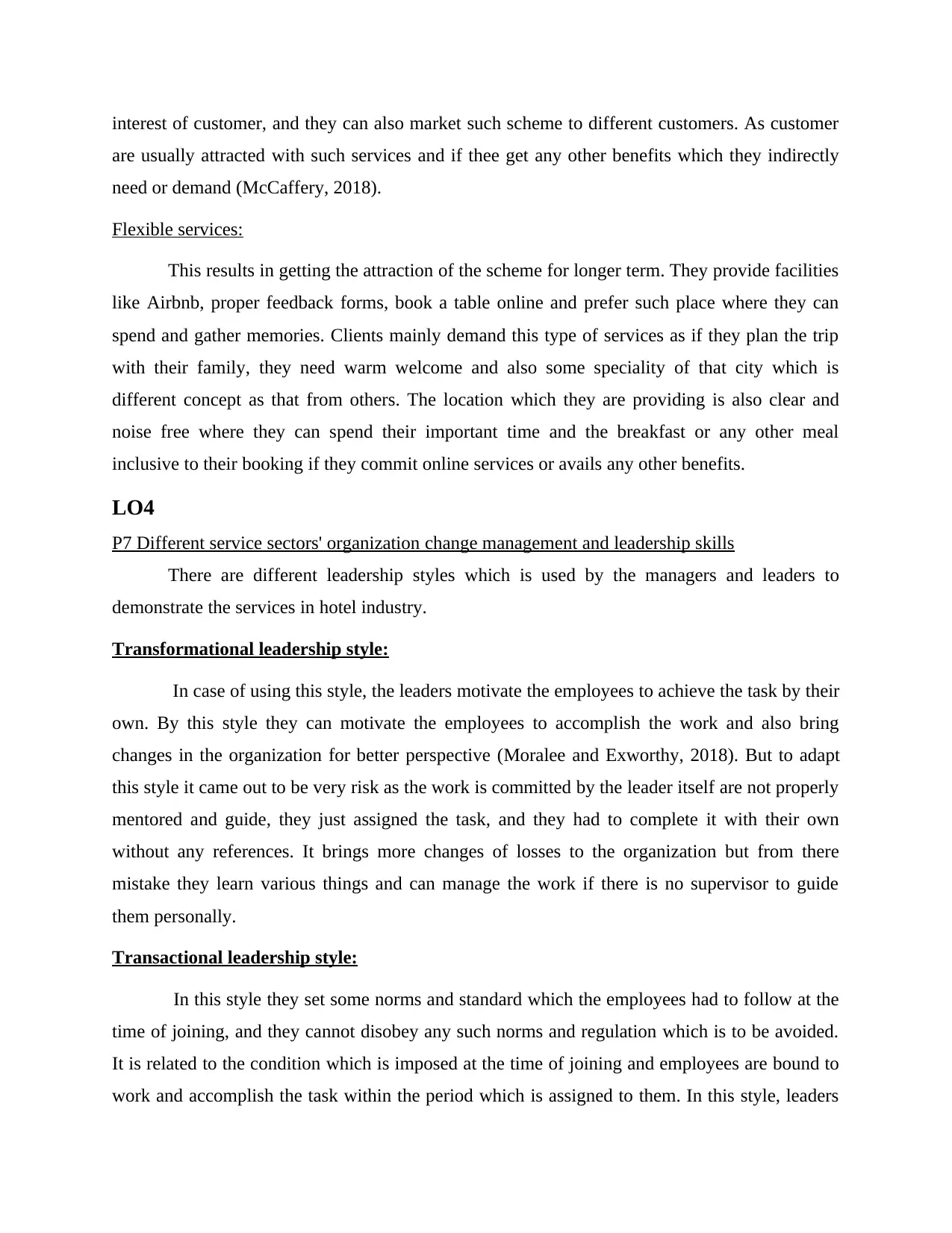
interest of customer, and they can also market such scheme to different customers. As customer
are usually attracted with such services and if thee get any other benefits which they indirectly
need or demand (McCaffery, 2018).
Flexible services:
This results in getting the attraction of the scheme for longer term. They provide facilities
like Airbnb, proper feedback forms, book a table online and prefer such place where they can
spend and gather memories. Clients mainly demand this type of services as if they plan the trip
with their family, they need warm welcome and also some speciality of that city which is
different concept as that from others. The location which they are providing is also clear and
noise free where they can spend their important time and the breakfast or any other meal
inclusive to their booking if they commit online services or avails any other benefits.
LO4
P7 Different service sectors' organization change management and leadership skills
There are different leadership styles which is used by the managers and leaders to
demonstrate the services in hotel industry.
Transformational leadership style:
In case of using this style, the leaders motivate the employees to achieve the task by their
own. By this style they can motivate the employees to accomplish the work and also bring
changes in the organization for better perspective (Moralee and Exworthy, 2018). But to adapt
this style it came out to be very risk as the work is committed by the leader itself are not properly
mentored and guide, they just assigned the task, and they had to complete it with their own
without any references. It brings more changes of losses to the organization but from there
mistake they learn various things and can manage the work if there is no supervisor to guide
them personally.
Transactional leadership style:
In this style they set some norms and standard which the employees had to follow at the
time of joining, and they cannot disobey any such norms and regulation which is to be avoided.
It is related to the condition which is imposed at the time of joining and employees are bound to
work and accomplish the task within the period which is assigned to them. In this style, leaders
are usually attracted with such services and if thee get any other benefits which they indirectly
need or demand (McCaffery, 2018).
Flexible services:
This results in getting the attraction of the scheme for longer term. They provide facilities
like Airbnb, proper feedback forms, book a table online and prefer such place where they can
spend and gather memories. Clients mainly demand this type of services as if they plan the trip
with their family, they need warm welcome and also some speciality of that city which is
different concept as that from others. The location which they are providing is also clear and
noise free where they can spend their important time and the breakfast or any other meal
inclusive to their booking if they commit online services or avails any other benefits.
LO4
P7 Different service sectors' organization change management and leadership skills
There are different leadership styles which is used by the managers and leaders to
demonstrate the services in hotel industry.
Transformational leadership style:
In case of using this style, the leaders motivate the employees to achieve the task by their
own. By this style they can motivate the employees to accomplish the work and also bring
changes in the organization for better perspective (Moralee and Exworthy, 2018). But to adapt
this style it came out to be very risk as the work is committed by the leader itself are not properly
mentored and guide, they just assigned the task, and they had to complete it with their own
without any references. It brings more changes of losses to the organization but from there
mistake they learn various things and can manage the work if there is no supervisor to guide
them personally.
Transactional leadership style:
In this style they set some norms and standard which the employees had to follow at the
time of joining, and they cannot disobey any such norms and regulation which is to be avoided.
It is related to the condition which is imposed at the time of joining and employees are bound to
work and accomplish the task within the period which is assigned to them. In this style, leaders
⊘ This is a preview!⊘
Do you want full access?
Subscribe today to unlock all pages.

Trusted by 1+ million students worldwide
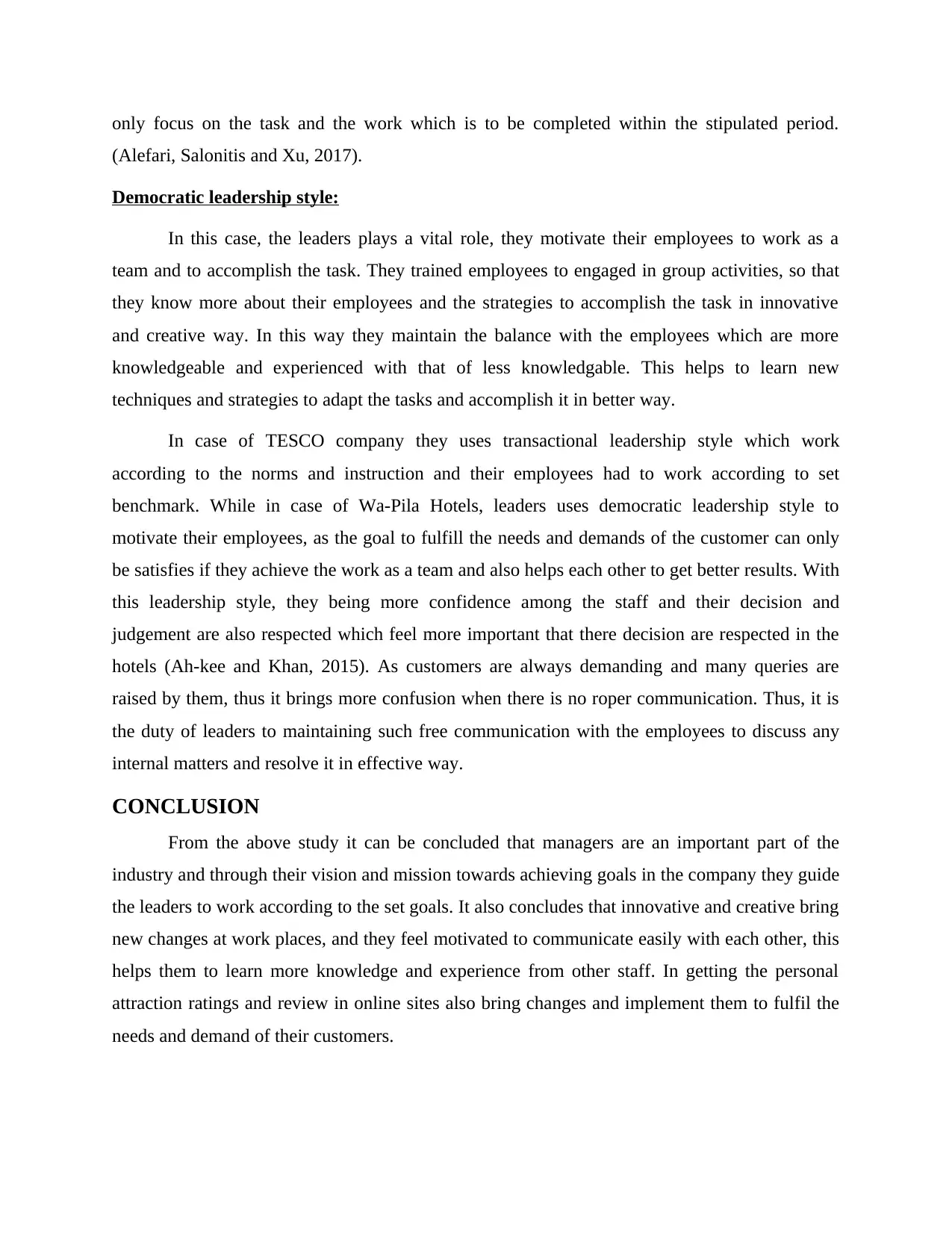
only focus on the task and the work which is to be completed within the stipulated period.
(Alefari, Salonitis and Xu, 2017).
Democratic leadership style:
In this case, the leaders plays a vital role, they motivate their employees to work as a
team and to accomplish the task. They trained employees to engaged in group activities, so that
they know more about their employees and the strategies to accomplish the task in innovative
and creative way. In this way they maintain the balance with the employees which are more
knowledgeable and experienced with that of less knowledgable. This helps to learn new
techniques and strategies to adapt the tasks and accomplish it in better way.
In case of TESCO company they uses transactional leadership style which work
according to the norms and instruction and their employees had to work according to set
benchmark. While in case of Wa-Pila Hotels, leaders uses democratic leadership style to
motivate their employees, as the goal to fulfill the needs and demands of the customer can only
be satisfies if they achieve the work as a team and also helps each other to get better results. With
this leadership style, they being more confidence among the staff and their decision and
judgement are also respected which feel more important that there decision are respected in the
hotels (Ah-kee and Khan, 2015). As customers are always demanding and many queries are
raised by them, thus it brings more confusion when there is no roper communication. Thus, it is
the duty of leaders to maintaining such free communication with the employees to discuss any
internal matters and resolve it in effective way.
CONCLUSION
From the above study it can be concluded that managers are an important part of the
industry and through their vision and mission towards achieving goals in the company they guide
the leaders to work according to the set goals. It also concludes that innovative and creative bring
new changes at work places, and they feel motivated to communicate easily with each other, this
helps them to learn more knowledge and experience from other staff. In getting the personal
attraction ratings and review in online sites also bring changes and implement them to fulfil the
needs and demand of their customers.
(Alefari, Salonitis and Xu, 2017).
Democratic leadership style:
In this case, the leaders plays a vital role, they motivate their employees to work as a
team and to accomplish the task. They trained employees to engaged in group activities, so that
they know more about their employees and the strategies to accomplish the task in innovative
and creative way. In this way they maintain the balance with the employees which are more
knowledgeable and experienced with that of less knowledgable. This helps to learn new
techniques and strategies to adapt the tasks and accomplish it in better way.
In case of TESCO company they uses transactional leadership style which work
according to the norms and instruction and their employees had to work according to set
benchmark. While in case of Wa-Pila Hotels, leaders uses democratic leadership style to
motivate their employees, as the goal to fulfill the needs and demands of the customer can only
be satisfies if they achieve the work as a team and also helps each other to get better results. With
this leadership style, they being more confidence among the staff and their decision and
judgement are also respected which feel more important that there decision are respected in the
hotels (Ah-kee and Khan, 2015). As customers are always demanding and many queries are
raised by them, thus it brings more confusion when there is no roper communication. Thus, it is
the duty of leaders to maintaining such free communication with the employees to discuss any
internal matters and resolve it in effective way.
CONCLUSION
From the above study it can be concluded that managers are an important part of the
industry and through their vision and mission towards achieving goals in the company they guide
the leaders to work according to the set goals. It also concludes that innovative and creative bring
new changes at work places, and they feel motivated to communicate easily with each other, this
helps them to learn more knowledge and experience from other staff. In getting the personal
attraction ratings and review in online sites also bring changes and implement them to fulfil the
needs and demand of their customers.
Paraphrase This Document
Need a fresh take? Get an instant paraphrase of this document with our AI Paraphraser
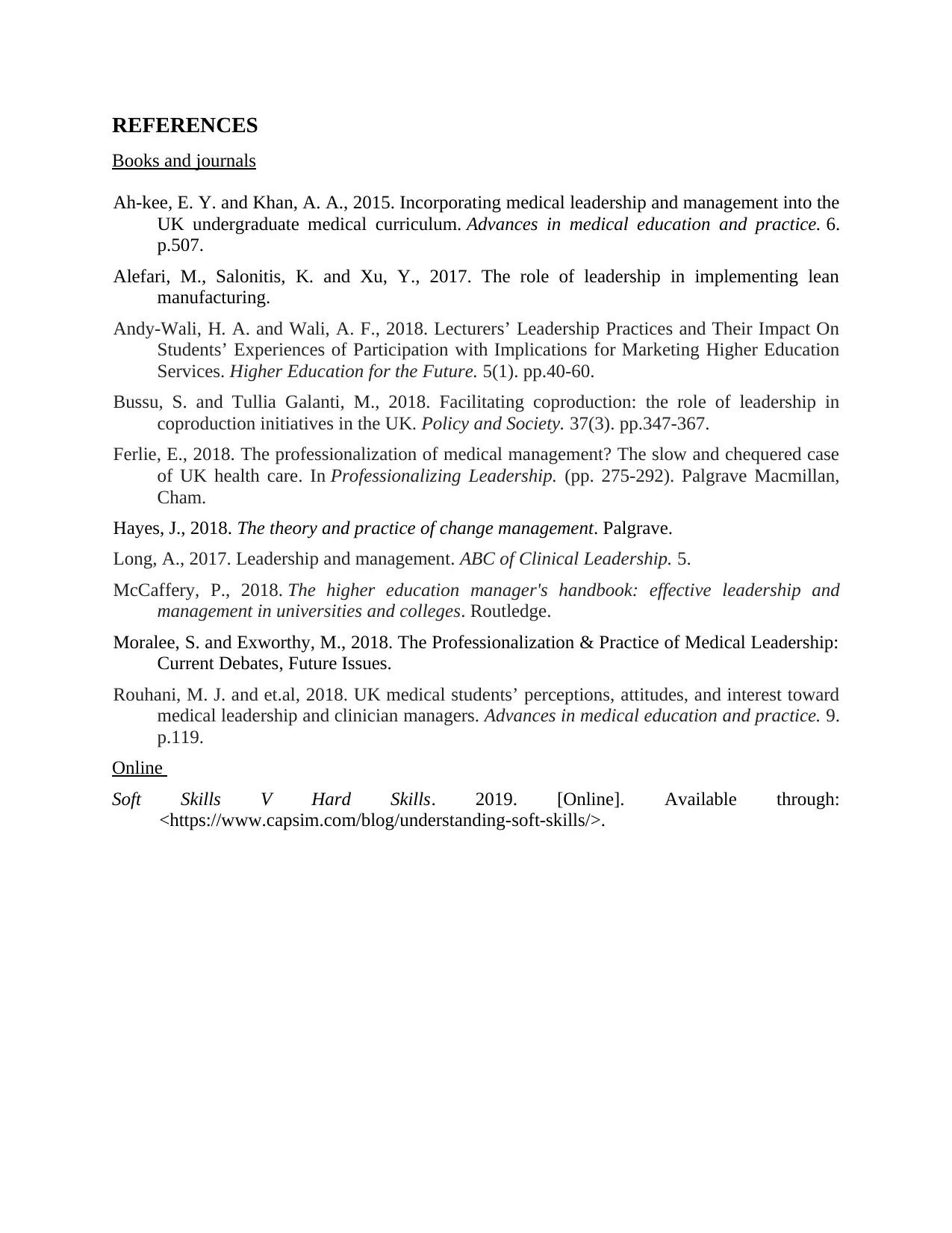
REFERENCES
Books and journals
Ah-kee, E. Y. and Khan, A. A., 2015. Incorporating medical leadership and management into the
UK undergraduate medical curriculum. Advances in medical education and practice. 6.
p.507.
Alefari, M., Salonitis, K. and Xu, Y., 2017. The role of leadership in implementing lean
manufacturing.
Andy-Wali, H. A. and Wali, A. F., 2018. Lecturers’ Leadership Practices and Their Impact On
Students’ Experiences of Participation with Implications for Marketing Higher Education
Services. Higher Education for the Future. 5(1). pp.40-60.
Bussu, S. and Tullia Galanti, M., 2018. Facilitating coproduction: the role of leadership in
coproduction initiatives in the UK. Policy and Society. 37(3). pp.347-367.
Ferlie, E., 2018. The professionalization of medical management? The slow and chequered case
of UK health care. In Professionalizing Leadership. (pp. 275-292). Palgrave Macmillan,
Cham.
Hayes, J., 2018. The theory and practice of change management. Palgrave.
Long, A., 2017. Leadership and management. ABC of Clinical Leadership. 5.
McCaffery, P., 2018. The higher education manager's handbook: effective leadership and
management in universities and colleges. Routledge.
Moralee, S. and Exworthy, M., 2018. The Professionalization & Practice of Medical Leadership:
Current Debates, Future Issues.
Rouhani, M. J. and et.al, 2018. UK medical students’ perceptions, attitudes, and interest toward
medical leadership and clinician managers. Advances in medical education and practice. 9.
p.119.
Online
Soft Skills V Hard Skills. 2019. [Online]. Available through:
<https://www.capsim.com/blog/understanding-soft-skills/>.
Books and journals
Ah-kee, E. Y. and Khan, A. A., 2015. Incorporating medical leadership and management into the
UK undergraduate medical curriculum. Advances in medical education and practice. 6.
p.507.
Alefari, M., Salonitis, K. and Xu, Y., 2017. The role of leadership in implementing lean
manufacturing.
Andy-Wali, H. A. and Wali, A. F., 2018. Lecturers’ Leadership Practices and Their Impact On
Students’ Experiences of Participation with Implications for Marketing Higher Education
Services. Higher Education for the Future. 5(1). pp.40-60.
Bussu, S. and Tullia Galanti, M., 2018. Facilitating coproduction: the role of leadership in
coproduction initiatives in the UK. Policy and Society. 37(3). pp.347-367.
Ferlie, E., 2018. The professionalization of medical management? The slow and chequered case
of UK health care. In Professionalizing Leadership. (pp. 275-292). Palgrave Macmillan,
Cham.
Hayes, J., 2018. The theory and practice of change management. Palgrave.
Long, A., 2017. Leadership and management. ABC of Clinical Leadership. 5.
McCaffery, P., 2018. The higher education manager's handbook: effective leadership and
management in universities and colleges. Routledge.
Moralee, S. and Exworthy, M., 2018. The Professionalization & Practice of Medical Leadership:
Current Debates, Future Issues.
Rouhani, M. J. and et.al, 2018. UK medical students’ perceptions, attitudes, and interest toward
medical leadership and clinician managers. Advances in medical education and practice. 9.
p.119.
Online
Soft Skills V Hard Skills. 2019. [Online]. Available through:
<https://www.capsim.com/blog/understanding-soft-skills/>.
1 out of 8
Related Documents
Your All-in-One AI-Powered Toolkit for Academic Success.
+13062052269
info@desklib.com
Available 24*7 on WhatsApp / Email
![[object Object]](/_next/static/media/star-bottom.7253800d.svg)
Unlock your academic potential
Copyright © 2020–2026 A2Z Services. All Rights Reserved. Developed and managed by ZUCOL.




